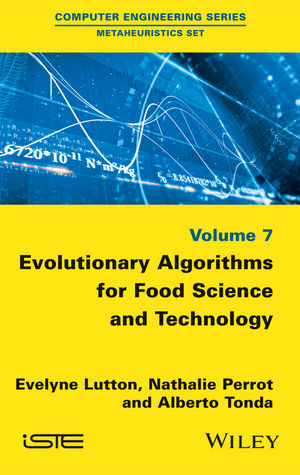
Evolutionary Algorithms for Food Science and Technology
ISTE Ltd and John Wiley & Sons Inc (Verlag)
978-1-84821-813-0 (ISBN)
Evelyne Lutton, INRA. Nathalie Perrot, INRA. Alberto Tonda, INRA.
Acknowledgments ix Preface xi
Chapter 1. Introduction 1
1.1. Evolutionary computation in food science and technology 1
1.2. A panorama of the current use of evolutionary algorithms in the domain 2
1.3. The purpose of this book 6
Chapter 2. A Brief Introduction to Evolutionary Algorithms 7
2.1. Artificial evolution: Darwin’s theory in a computer 8
2.2. The source of inspiration: evolutionism and Darwin’s theory 10
2.3. Darwin in a computer 12
2.4. The genetic engine 14
2.4.1. Evolutionary loop 14
2.4.2. Genetic operators 17
2.4.3. GAs and binary representation 17
2.4.4. ESs and continuous representation 18
2.4.5. GP and tree-based representation 20
2.4.6. GE and grammar-based representation 23
2.4.7. Selective pressure 23
2.5. Theoretical issues 24
2.6. Beyond optimization 26
2.6.1. Multimodal landscapes 26
2.6.2. Co-evolution 27
2.6.3. Multiobjective optimization 29
2.6.4. Interactive optimization 31
Chapter 3. Model Analysis and Visualization 33
3.1. Introduction 33
3.1.1. Experimental data 37
3.1.2. Modeling milk gel competition at the interface 39
3.1.3. Learning the parameters of the model using an evolutionary approach 41
3.1.4. Visualization using the GraphDice environment 43
3.2. Results and discussion 45
3.2.1. Sensitivity analysis 45
3.2.2. Visual exploration of the model 46
3.2.3. Theoretical discussion 48
3.3. Conclusions 53
3.4. Acknowledgments 55
Chapter 4. Interactive Model Learning 57
4.1. Introduction 58
4.2. Background 59
4.2.1. Bayesian networks 59
4.2.2. The structure learning problem 60
4.2.3. Visualizing BNs 63
4.3. Proposed approach 63
4.4. Experimental setup 66
4.5. Analysis and perspectives 67
4.6. Conclusion . 70
Chapter 5. Modeling Human Expertise Using Genetic Programming 71
5.1. Cooperative co-evolution 72
5.2. Modeling agrifood industrial processes 73
5.2.1. The Camembert cheese-ripening process 74
5.2.2. Modeling expertise on cheese ripening 77
5.3. Phase estimation using GP 77
5.3.1. Phase estimation using a classical GP 77
5.3.2. Phase estimation using a Parisian GP 81
5.3.3. Variable population size strategies in a Parisian GP 86
5.3.4. Analysis 98
5.4. Bayesian network structure learning using CCEAs 99
5.4.1. Recalling some probability notions 99
5.4.2. Bayesian networks 100
5.4.3. Evolution of an IM 105
5.4.4. Sharing 109
5.4.5. Immortal archive and embossing points 110
5.4.6. Description of the main parameters 111
5.4.7. BN structure estimation 112
5.4.8. Experiments and results 114
5.4.9. Analysis 122
5.5. Conclusion 123
Conclusion 125
Bibliography 127
Index 149
| Erscheint lt. Verlag | 13.12.2016 |
|---|---|
| Verlagsort | London |
| Sprache | englisch |
| Maße | 163 x 241 mm |
| Gewicht | 426 g |
| Themenwelt | Mathematik / Informatik ► Informatik ► Theorie / Studium |
| Technik ► Elektrotechnik / Energietechnik | |
| Technik ► Lebensmitteltechnologie | |
| Weitere Fachgebiete ► Land- / Forstwirtschaft / Fischerei | |
| ISBN-10 | 1-84821-813-3 / 1848218133 |
| ISBN-13 | 978-1-84821-813-0 / 9781848218130 |
| Zustand | Neuware |
| Haben Sie eine Frage zum Produkt? |
aus dem Bereich


